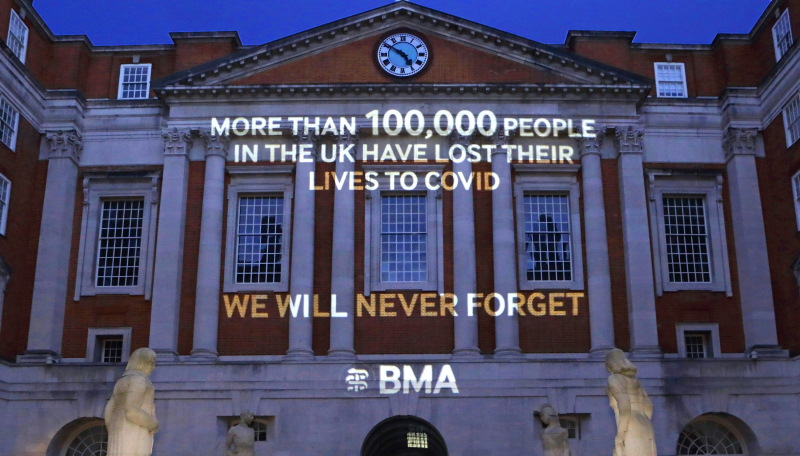UK is first European country to see COVID-19 deaths pass 100,000

More than 100,000 people have died within 28 days of a positive COVID-19 test in the UK, the first European country to meet that grim milestone.
The UK is only the fifth country after the US, Brazil, India and Mexico to pass that threshold, after a surge in cases following the holiday period around the turn of the year.
There were another 1,631 deaths recorded yesterday, and while there are signs that the new lockdown is starting to have an impact on new cases, the number of hospitalised COVID-19 patients – currently around 35,000 – has so far only stabilised and hasn’t started to fall.
Prime Minister Boris Johnson said in a televised address that its “hard to compute the sorrow contained in that statistic. I offer my deepest condolences to everyone who has lost a loved one.”
The PM also promised to learn the lessons of the pandemic so that when vaccines “have finally freed us from this virus, and put us on a path to recovery, we will make sure we learn the lessons and reflect and prepare.” He also said 6.8 million people in the UK have now received one of the available COVID-19 vaccines.
Opposition leader Sir Keir Starmer said the news represented a “national tragedy and a terrible reminder of all that we have lost as a country.”
The British Medical Association (BMA) is marking the landmark with an installation on its London headquarters this evening (pictured), commenting that “we must not and will not forget this day.”
BMA chair Dr Chaand Nagpaul said: “we must learn the lessons of this tragedy. We must understand why so many excess lives have been lost in our nation so that we can prevent this scale of death from coming to pass in any future pandemic.”
He added that “many health and care workers…lost their lives in the course of doing their jobs, caring for others in the most challenging of circumstances as we have seen NHS services tested to their limits.”
England’s chief medical officer Professor Chris Witty wouldn’t be drawn on the range of fatalities expected before the pandemic could be brought under control, but did say that “unfortunately we are going to see quite a lot more deaths over the next few weeks before the effects of the vaccines begin to be felt.”
During the early stages of the pandemic, the UK government had said it hoped to contain the number of deaths to around 20,000.
On the positive side, NHS England chief executive Sir Simon Stevens pointed out that the death rate for patients hospitalised with COVID-19 has improved roughly from a third to a fifth – thanks to improvements in care and new drug therapies – and additional drugs are likely to emerge that could improve that even further.
“I think we can see a world in which coronavirus may be more treatable,” he told the briefing, but for now, the emphasis has to be the combination of measures to reduce infections and vaccinations.
Vaccine access
Johnson also responded to questions at the briefing about the EU’s decision to require vaccine manufacturers to register exports from the bloc in the midst of a dispute with AstraZeneca over small-than-expected supplies of its shot.
The EU has said it has no plans to impose an export ban, and the PM said he had “total confidence” that the supply of vaccine doses into the UK won’t be disrupted.
“The creation of these vaccines has been a wonderful example of multinational cooperation and I think that one of the lessons the world has had to learn is the need to…fight the pandemic together,” he said.
“I don’t want to see restrictions on the supply of [PPE, drugs or vaccines] across borders,” he continued, adding: “I’m sure that will be widely supported across the EU as well.”











